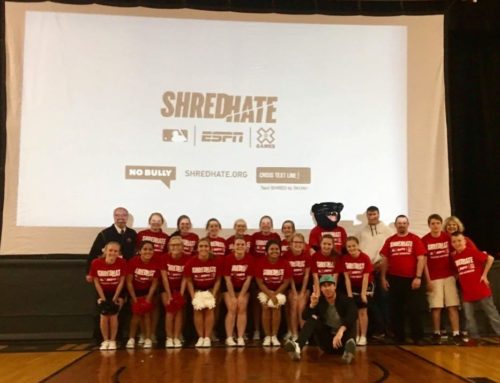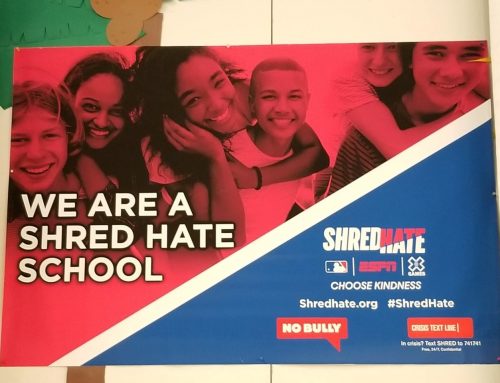
Pittsburgh Public Schools have embraced and utilized the Shred Hate program for two years, catalyzing change in how educators, students, and parents combat bullying.
The leadership team at Brookline, a school in the Pittsburgh Public Schools district, is getting ready to begin their next training in social and emotional learning. Through it, they hope to guide their students even more effectively through understanding and managing their emotions, as well as their peers. It’s a key component to building empathy and positive social culture, and the latest program to be offered by Shred Hate.
Founded in 2016, the Shred Hate program provides bullying prevention resources to schools and is supported by ESPN, MLB, and the X Games. The ultimate goal of the initiative is to cause a tangible reduction in bullying incidents. Because both school and sport environments can be either strong enablers for or protections against bullying, it is imperative to guide the social cultures of these spaces for the latter. And that is the goal Brookline is working towards with its latest training.
The First Step Towards Change
But where does one start in order to enact change in an environment as complex as a classroom? Because of the entire Pittsburgh Public School district’s success, we asked Ida Simpson, Project Manager at the Office of School Performance, how they were able to thrive under the Shred Hate program.
“It was actually an opportunity brought to us by the Pittsburgh Pirates,” says Ida. “It fit perfectly at the time as something that can reach all levels of the district…it brings everybody to the table.”
The program was initially introduced to 22 schools, with most of those schools either already engaged or preparing to implement our new social and emotional learning curriculum. Almost immediately, it brought positive changes and increased awareness around what bullying actually is and how it can be best addressed.
“With parents it became huge, because a lot of people were talking about bullying in the school system…It’s really helpful for the district,” she says.
From the outset, all levels of the community were committed to understanding Shred Hate’s mission and to putting in consistent effort in creating positive social visions. “Parents have feedback on how they feel like it is dropping down the bullying because of that community. It brings the kids in and they are able to defuse the situations among themselves.”
Pittsburgh Pirates Lend A Helping Hand
Additionally, Ida says that the recognition the Pittsburgh Pirates and the Shred Hate program give to outstanding community members also bolsters the efficacy of the program. They have implemented monthly Upstander and Upstaffer awards that recognize students and staff that have gone above and beyond in preventing bullying.
“Last year when starting the Upstander of the Month, I really wanted to do something impactful for kids that are embracing this mission,” says Joel Gray, Community Outreach Manager for the Pittsburgh Pirates.
When talking about the Upstander program, he remembered two students who initiated their own “Kindness Compassion Week” in their school. Through Shred Hate they are able to be acknowledged for their message and amplify it at the same time. The Pirates and the school district recognize it’s just as important to celebrate the positive while preventing bullying to further encourage change.
And all of this is successful because of the tight connections between the Pittsburgh Pirates, the school district, and the community. “We are blessed to live in a city that cares about sports…so people can really relate to our brand,” Joel explains. This, along with educators championing the mission of Shred Hate, leads to a movement with genuine compassion behind it. It’s an authenticity that is easily noticeable by students, and gives them an outlet to be both heard and empowered.
Coming Full Circle
All of these connections, programs, and planning culminate in the differences seen in the schools themselves, the points of direct contact with the students. One shining example of this is Brookline itself. After the social and emotional training concludes, Sara Sikora-Lewis, Teacher and Head of the Shred Hate Leadership Team, reflects on the changes she has seen.
“I have seen our school culture improve. We had a Solution Team twice at the end of the year with a group of 4th grade girls. It was successful!” says Sara. Solution Teams are educator-moderated meetings with the bully, bystanders, and student upstanders. They are held after a bullying incident is brought to the attention of a staff member. There are a total of three sessions to help other students empathize with the target and come up with a solution to reduce bullying on their own. The targets themselves only attend the last meeting, where they can reflect on the positive changes that have been made over the past few months.
Change and awareness have also spread outside of Solution Teams according to Sara. “Two of our 7th grade students were also Upstanders and began a kindness week movement that we did again this school year,” she explains. “Spreading kindness is free and it helps our school culture thrive.”
She also reports that the social and emotional learning has been well received, especially in her own class. Her kindergarteners love using compliments and partaking in Mindfulness and Restorative Circles. It’s a testament to the ability to curate kindness from an early age and prepare students for an education of empathy instead of bullying.
Brookline’s principal, John Vater, highlights points of success that parallel key components previously mentioned. Students and teachers can vote for their own student of the month in a similar fashion to Upstanders. They also focus on monthly traits or emotions to further encourage and build understanding of empathy at a school-wide level.
In consequence, Principal Vater has seen a qualitative change in the amount of bullying incidents at his school. Surveys consistently distributed to parents have noted a reduction in the amount of bullying and acknowledged better solutions for the instances that do occur.
“Students [now] have tools to navigate complex relationships,” he says. And that is the key of the Shred Hate program. The relationship with the Pirates, the coordination of the district, and the support of the community lend to building a better future for the students by giving them the tools and the space to do so.
“They are forming a lasting resource on how to effectively cope with difficult conflicts throughout life,” says Sara. And from the growing positivity over the two years Brookline has joined the Shred Hate movement, it seems she is right.





